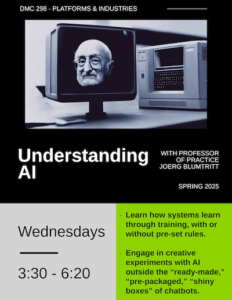Welcome to the Wheaton Institute for the Interdisciplinary Humanities!
The WIIH connects the humanities to other fields of study via a changing themes. The current theme is about reclaiming AI for the humanities.
New Class: Understanding AI
DMC 298 – Platforms and Industries.

The course Understanding AI introduces into the concept of AI and machine learning. We will explore how systems learn through training with or without pre-set rules, and how they generalize from their training data to quite arbitrary tasks. We will look into creative experiments with AI and applications outside the “ready-made”, “pre-packaged”, “shiny boxes” of Chatbots and prompt-based image generation, to get an idea on the true potential of AI (and also its limitations).
Each week will be divided into three sections: concept and theory, practical examples, and creative experiements.
Prerequisites: Outside the necessary interest in general digital media and communications topics, some basic coding experience in any programming language will be really helpful, as well as some general openness to mathematical thinking (i.e. if you want to enjoy the class you should not generally hate math and computers).
AI Humanities
Artificial intelligence has become popular and is accessible like never before. In the 70 years since its original conception in the 1956 seminal workshop at Dartmouth College, AI for most people remained hardly more than a science fiction idea. But now, everybody can try it out with a growing variety of products and services offering image generation, natural language processing, or assisted driving.
People are experiencing the technology mostly in a playful, not at all engineering or science driven way: Writing prompts to generate mostly silly and often funny images, letting a large language model write poems or short texts, trying to outsmart teachers by submitting AI generated papers. Generative writing, creating images, editing videos, or composing music have become the focus of the tech industry, attracting tens of billions of dollars in investments.
These are not the topics of engineering. These are the topics of the humanities. And the humanities are not just delivering and shaping the applications. The critical self-reflectivity that is defining for all the humanities delivers the foundation to understand the new technology, to make sense of it, and to define its ethical boundaries independent of the pragmatics of engineering and business.
Critical Discussion
A vivid and critical discussion about the immediate ethical problems that AI poses on society and on individuals has already been going on for at least a decade in academia, policy circles, and more and more in mainstream media. The range of issues is wide: Data bias and discrimination, violation of informational self-determination and privacy, undermining of authorship, precarious labor, fake news, libel and defamation, creation of harmful images, and a general lack of accountability and reliability inherent in all machine learning technologies. The arguments of critiquing the all too naive techno-optimism deliver the foundation on which we can build a future with AI in a critically constructive way.
Reclaiming AI for the Humanities
We want to revisit and reclaim AI as an endeavor of the humanities, deeply philosophical, artistic and creative, a project for the liberal arts:
- How can we understand artificial intelligence as part of the liberal arts, and of the humanities in particular, and not just as another piece of technology?
- How does AI affect the humanities and how should AI be shaped by the humanities?
- What philosophy comes implicit or even explicit in AI? What philosophy can potentially be modeled with AI?
- How can higher education, liberal arts education in particular, make use of AI? What are risks?
- How does AI touch the life and experience of the students already now, and in the foreseeable future?
Engage and reclaim AI for the humanities!
For questions, comments, and suggestions, please reach out to me:
Joerg Blumtritt, Director of the WIIH
